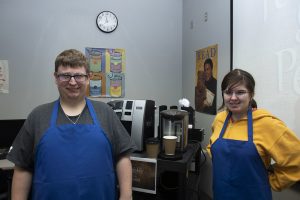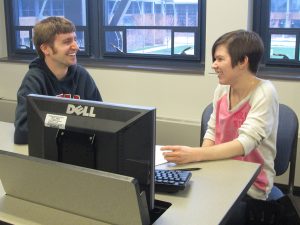Heartland College’s HALO prepares special needs students for learning, life
By Holly Eitenmiller For Chronicle Media — November 26, 2019
Portable Perks is popular coffee stand on the Heartland Community College campus that is run by the HALO program. Student workers learn on-the-job skills, money management, and earn food handler licenses. (Photo courtesy of Heartland Community College)
When kids graduate from high school, most parents are looking forward to seeing their child move on to college or a rewarding trade. This isn’t always so for parents of children with developmental disabilities, but thanks to programs like the HALO, they can.
In October, Heartland Community College in Normal celebrated the 10th anniversary of Heartland Academy for Learning Opportunities (HALO), a program tailored to meet the transitional needs of the intellectually disabled.
“When it first began, instructors came to Disability Support Services with concerns that their techniques for teaching weren’t making a difference,” said Barb Glover, program assistant for Student Access & Accommodation Services. “They began looking at different coursework, parents included. They took trips out of state, looked at other colleges in Illinois and concluded that it would be worthwhile to develop similar programs that help them be better citizens, live independently and work gainfully.”
Both Lewis and Clark College, in Godfrey, and DuPage County’s Elmhurst College offer similar programs. Because of population density, Elmhurst Learning and Success Academy (ELSA) is a four-year, post-secondary certificate program, with fall, January, spring and summer terms for part- and full-time students.
Lewis and Clark’s College for Life (CFL) provides a cafeteria plan of classes priced per course. The program serves nine southern Illinois counties, and there’s often a waiting list for students. A $272,000 grant through the Southern Illinois Transition Project enabled the college to open a second center at its N.O. Nelson Campus in Edwardsville.
Like ELSA and CFL, HALO became rapidly became an evolutionary program, conforming to the opportunities within the community and the needs of the students, along with funding opportunities, as they became available.
“Every community is a little different, and HALO was built for what the community may have needed then, but things have changed since the very beginning of the program,” Glover explained. “A lot of programs change or are discontinued at the state level. The focus has really become providing that inclusionary college experience.”
For $1,000 per semester, students ages 18-28 attend two classes per day on Tuesdays and Thursdays. The classes range from computer technology to cooking, which happen to be the most popular classes. Heartland also offers independent living, money development and health and wellness classes.

Heartland Community College’s HALO program offers peer mentoring for students as part of its supportive and inclusive college experience for adults with special needs disabilities. (Photo courtesy of Heartland Community College
Social development courses are also available, although social skills are an integral part of the program as a whole. Each day, HALO students are given ample time between classes to exercise the life skills they’ve been taught in class.
“They have to make choices on their own, and they’re taught how to utilize their break time carefully. We really put them to the test,” Glover said. “They can demonstrate good choices. There’s a fitness center, we have a bookstore, a library. There are clubs and organizations that encourage student engagement.”
HALO runs a popular coffee stand, Portable Perks, that serves coffee, hot chocolate and tea. It enables student workers to communicate, learn money and debit card transaction skills and earn food handler licenses. Some students contribute to Portable Perks artistically, by creating daily display boards with that day’s prices and building Facebook advertisements.
“I’ve got one master Perks salesperson that goes from office to office on every floor of the building, interacting with everyone,” Glover said. “He greets them, ‘Good morning! How are you today? We’ve got some great coffee here!’ Someone said it’s like ‘love in a cup’ because someone’s coming by and greeting them so kindly.”
Responsibility is a factor that’s perpetually reinforced throughout the HALO curriculum. First-year students often find this aspect challenging, but second-year students usually develop into mentors for the freshman.
“’Responsibility’, the instructors use that word a lot, in terms of class being much like a job, with regard to team work and accountability,” Glover said. “You’re letting another person down if you don’t adhere to responsibility, because they’re relying on you to get your homework done, just as an employer will rely you to get your job done.”
HALO has partnerships with Bloomington-Normal-based agencies like Marcfirst and Bridgeway to connect students with job shadowing, job coaching, and career opportunities.
Around 40 percent of HALO students hold part-time jobs, but many who graduate from the program return because they want to keep learning and continue enjoying the inclusion that college life offers.
“We’ve had students that go beyond our program and take credit courses, or some have joined classes on an audit-basis so they can learn and interact in the class,” Glover said. “They take subjects they love, like History, and they just eat it up. They can go to museums or see movies and have the extra confidence in having that extra knowledge.”
For more information on HALO, ELSA and CFL, visit the following websites; www.heartland.edu/halo/ www.elmhurst.edu/academics/elmhurst-learning-success-academy/ www.lc.edu/disability/







